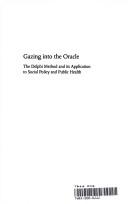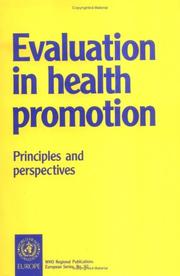| Listing 1 - 6 of 6 |
Sort by
|

ISBN: 1853021040 Year: 1996 Publisher: London : Jessica Kingsley Publishers,
Abstract | Keywords | Export | Availability | Bookmark
 Loading...
Loading...Choose an application
- Reference Manager
- EndNote
- RefWorks (Direct export to RefWorks)
Delphi method --- Delphi, Méthode --- Services, Human --- Delphi technique --- Delphi method. --- Delphi, Méthode --- Health planning. --- Human services --- Social planning. --- Social policy. --- Planning. --- Social planning --- Social policy --- Health planning --- Planification sociale --- Politique sociale --- Santé publique --- Planning --- Planification --- #PBIB:1999.2 --- National planning --- State planning --- Economic policy --- Family policy --- Social history --- Social development planning --- Comprehensive health planning --- Health care planning --- Health services planning --- Medical care --- Medical care planning --- Public health --- Medical policy --- Health services administration --- Decision making --- Technological forecasting
Book
ISBN: 9289013982 0585492506 Year: 2003 Publisher: Copenhagen : WHO Regional Office for Europe,
Abstract | Keywords | Export | Availability | Bookmark
 Loading...
Loading...Choose an application
- Reference Manager
- EndNote
- RefWorks (Direct export to RefWorks)
Health care systems across the WHO European Region have done and are doing much to tackle the complex and daunting problem of poverty and health. This book describes 12 initiatives already undertaken in 10 WHO Member States. It documents WHO's preliminary findings on how health care systems can help to alleviate poverty, and reaches three main conclusions: health care systems can indeed take effective action to improve the health of the poor; sometimes health care systems can actually represent an additional barrier for the poor and there is an urgent need for more knowledge, training and capacity-building in this area. It is hoped that the information presented here will contribute to the efforts to improve health and increase equity by tackling poverty and its effects on health across the length and breadth of Europe.
Public health --- Poor --- Community health services --- Social aspects --- Economic aspects --- Medical care
Book
ISBN: 9781441959218 9781441959201 Year: 2010 Publisher: New York : Springer,
Abstract | Keywords | Export | Availability | Bookmark
 Loading...
Loading...Choose an application
- Reference Manager
- EndNote
- RefWorks (Direct export to RefWorks)
Health Assets in a Global Context: Theory, Methods, Action Edited by Antony Morgan, Maggie Davies, and Erio Ziglio As global health inequities continue to widen, policymakers are redoubling their efforts to address them. Yet the effectiveness and quality of these programs vary considerably, sometimes resulting in the reverse of expected outcomes. While local political issues or cultural conflicts may play a part in these situations, an important new book points to a universal factor: the prevailing deficit model of assessing health needs, which puts disadvantaged communities on the defensive while ignoring their potential strengths. The asset model proposed in Health Assets in a Global Context offers a necessary complement to the problem-focused framework by assessing multiple levels of health-promoting aspects in populations, and promoting joint solutions between communities and outside agencies. The book provides not only rationales and methodologies (e.g., measuring resilience and similar elusive qualities) but also concrete examples of asset-based initiatives in use across the world on the individual and community levels, including: ¢ Strengthening the assets of disadvantaged women (Germany). ¢ Sustainable community-based development programs (India). ¢ Using parental assets to control child malaria (West Africa). ¢ Asset/evidence-based health promotion in the schools (Romania). ¢ Evaluating asset-based programs (Latin America). ¢ Using social capital to promote health equity (Australia). Health Assets in a Global Context offers a new, positive lens for viewing the world's most resistant public health crises, making it fundamental reading for researchers and graduate students in public health, especially those involved in health promotion, health disparities, social determinants of health, and global health.
Medicine & Public Health. --- Public Health. --- Health Promotion and Disease Prevention. --- Health Administration. --- Medicine. --- Public health. --- Practice of medicine. --- Médecine --- Santé publique --- Medical care. --- Health promotion. --- Health planning. --- Community health services.
Book
ISBN: 1489999299 1441959203 9786612928345 1282928341 1441959211 Year: 2010 Publisher: New York, NY : Springer New York : Imprint: Springer,
Abstract | Keywords | Export | Availability | Bookmark
 Loading...
Loading...Choose an application
- Reference Manager
- EndNote
- RefWorks (Direct export to RefWorks)
Health Assets in a Global Context: Theory, Methods, Action Edited by Antony Morgan, Maggie Davies, and Erio Ziglio As global health inequities continue to widen, policymakers are redoubling their efforts to address them. Yet the effectiveness and quality of these programs vary considerably, sometimes resulting in the reverse of expected outcomes. While local political issues or cultural conflicts may play a part in these situations, an important new book points to a universal factor: the prevailing deficit model of assessing health needs, which puts disadvantaged communities on the defensive while ignoring their potential strengths. The asset model proposed in Health Assets in a Global Context offers a necessary complement to the problem-focused framework by assessing multiple levels of health-promoting aspects in populations, and promoting joint solutions between communities and outside agencies. The book provides not only rationales and methodologies (e.g., measuring resilience and similar elusive qualities) but also concrete examples of asset-based initiatives in use across the world on the individual and community levels, including: • Strengthening the assets of disadvantaged women (Germany). • Sustainable community-based development programs (India). • Using parental assets to control child malaria (West Africa). • Asset/evidence-based health promotion in the schools (Romania). • Evaluating asset-based programs (Latin America). • Using social capital to promote health equity (Australia). Health Assets in a Global Context offers a new, positive lens for viewing the world’s most resistant public health crises, making it fundamental reading for researchers and graduate students in public health, especially those involved in health promotion, health disparities, social determinants of health, and global health.
Community health services. --- Delivery of health care. --- Medical care -- United States. --- Medical care --- Health promotion --- Health planning --- Community health services --- Health Care Facilities, Manpower, and Services --- Regional Health Planning --- Health Status --- Preventive Health Services --- Delivery of Health Care --- Health Promotion --- Health Status Disparities --- Community Health Planning --- Healthcare Disparities --- Health Planning --- Demography --- Patient Care Management --- Health Services --- Health Care --- Health Care Quality, Access, and Evaluation --- Population Characteristics --- Health Care Economics and Organizations --- Epidemiologic Measurements --- Social Sciences --- Health Services Administration --- Public Health --- Anthropology, Education, Sociology and Social Phenomena --- Environment and Public Health --- Medicine --- Public Health - General --- Medicine - General --- Health & Biological Sciences --- Medicine. --- Public health. --- Practice. --- Community health --- Health services --- Hygiene, Public --- Hygiene, Social --- Public health services --- Public hygiene --- Sanitary affairs --- Social hygiene --- Medical practice --- Practice of medicine --- Clinical sciences --- Medical profession --- Health promotion. --- Health administration. --- Medicine & Public Health. --- Public Health. --- Health Promotion and Disease Prevention. --- Health Administration. --- Health --- Human services --- Biosecurity --- Health literacy --- Medicine, Preventive --- National health services --- Sanitation --- Human biology --- Life sciences --- Medical sciences --- Pathology --- Physicians --- Physician practice acquisitions --- Practice of medicine. --- Health Workforce --- Health promotion programs --- Health promotion services --- Promotion of health --- Wellness programs --- Preventive health services --- Health education
Digital
ISBN: 9781441959218 9781441959324 9781441959201 9781489999290 Year: 2010 Publisher: New York, NY Springer
Abstract | Keywords | Export | Availability | Bookmark
 Loading...
Loading...Choose an application
- Reference Manager
- EndNote
- RefWorks (Direct export to RefWorks)
Health Assets in a Global Context: Theory, Methods, Action Edited by Antony Morgan, Maggie Davies, and Erio Ziglio As global health inequities continue to widen, policymakers are redoubling their efforts to address them. Yet the effectiveness and quality of these programs vary considerably, sometimes resulting in the reverse of expected outcomes. While local political issues or cultural conflicts may play a part in these situations, an important new book points to a universal factor: the prevailing deficit model of assessing health needs, which puts disadvantaged communities on the defensive while ignoring their potential strengths. The asset model proposed in Health Assets in a Global Context offers a necessary complement to the problem-focused framework by assessing multiple levels of health-promoting aspects in populations, and promoting joint solutions between communities and outside agencies. The book provides not only rationales and methodologies (e.g., measuring resilience and similar elusive qualities) but also concrete examples of asset-based initiatives in use across the world on the individual and community levels, including: • Strengthening the assets of disadvantaged women (Germany). • Sustainable community-based development programs (India). • Using parental assets to control child malaria (West Africa). • Asset/evidence-based health promotion in the schools (Romania). • Evaluating asset-based programs (Latin America). • Using social capital to promote health equity (Australia). Health Assets in a Global Context offers a new, positive lens for viewing the world’s most resistant public health crises, making it fundamental reading for researchers and graduate students in public health, especially those involved in health promotion, health disparities, social determinants of health, and global health.
Hygiene. Public health. Protection --- volksgezondheid --- preventieve gezondheidszorg --- gezondheidszorg --- gezondheidsvoorzieningen --- gezondheidspromotie


ISBN: 9289013591 Year: 2001 Volume: 92 Publisher: Copenhagen World Health Organization
Abstract | Keywords | Export | Availability | Bookmark
 Loading...
Loading...Choose an application
- Reference Manager
- EndNote
- RefWorks (Direct export to RefWorks)
Evaluation Studies. --- Gezondheidsvoorlichting. --- Health education. --- Health promotion. --- Promotion de la santé --- Éducation sanitaire --- Évaluation. --- Hygiene. Public health. Protection --- Sociology of health --- Health promotion --- Community health services --- Urban health --- Medical policy --- Health education --- #SBIB:309H261 --- #SBIB:316.334.3M50 --- #SBIB:35H436 --- Gezondheidsbeleid --- Gezondheidsbevordering --- Health promotion programs --- Health promotion services --- Promotion of health --- Wellness programs --- Health --- Hygiene --- Voorlichting: toepassingsgebieden --- Organisatie van de gezondheidszorg: algemeen, beleid --- Beleidssectoren: welzijn, volksgezondheid en cultuur --- Politique de la santé --- Study and teaching --- Preventive health services --- Communication in medicine --- Education --- Gezondheid --- Gezondheidsvoorlichting en -opvoeding --- Sensibilisering --- Evaluatie --- Voorlichtingscampagnes --- Gezondheidsopvoeding --- Voorlichtingscampagne --- Voeding --- Gedrag --- Drank
| Listing 1 - 6 of 6 |
Sort by
|

 Search
Search Feedback
Feedback About
About Help
Help News
News